Middle East
US, Arab nations plan for postwar Gaza, timeline for Palestinian state
The Washington Post February 15, 2024
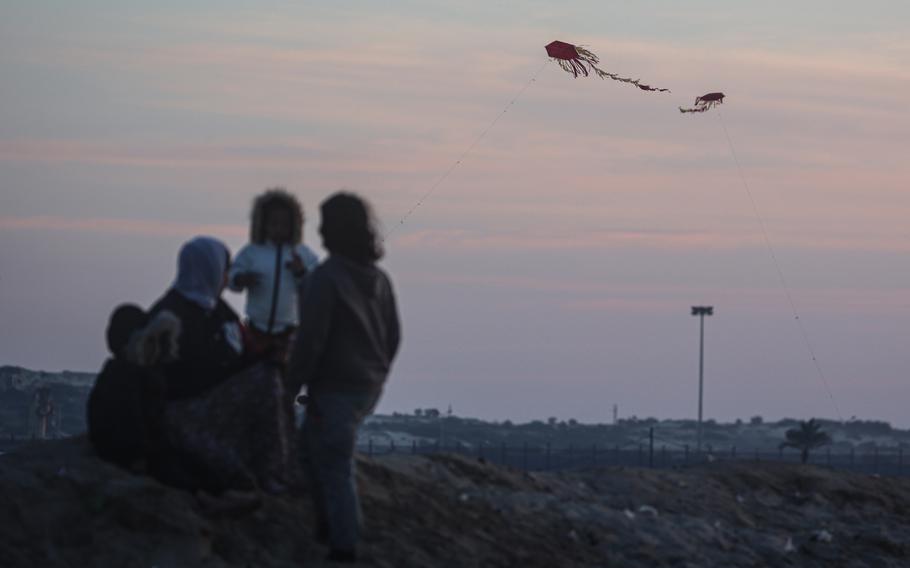
Children fly a kite at a makeshift tent camp for displaced Palestinians in Rafah, southern Gaza Strip, on Sunday, Feb. 11, 2024. (Loay Ayyoub/for The Washington Post)
The Biden administration and a small group of Middle East partners are rushing to complete a detailed, comprehensive plan for long-term peace between Israel and Palestinians, including a firm timeline for the establishment of a Palestinian state, that could be announced as early as the next several weeks.
The urgency of the effort is tied directly to a proposed pause in the fighting and release of hostages held in Gaza by Hamas that is being negotiated by the United States, Qatar and Egypt.
An initial cease-fire, projected to be at least six weeks, would provide time to make the plan public, recruit additional support and take the initial steps toward its implementation, including the formation of an interim Palestinian government, according to U.S. and Arab officials. Planners hope a hostage agreement can be reached before the beginning of Ramadan, the month of Muslim fasting that begins March 10, lest it compound the deprivation and pressure-cooker atmosphere in Gaza.
“The key is the hostage deal,” said one U.S. official among several American and Arab diplomats who discussed the subject on the condition of anonymity to avoid derailing the plan before it is completed.
But even as planning participants — including Egypt, Jordan, Qatar, Saudi Arabia, the United Arab Emirates and Palestinian representatives, in addition to the United States — work to reach agreement among themselves, there are new fears that a looming Israeli attack on Rafah will throw the Gaza crisis into overdrive and bury both the hostage deal and long-term peace efforts.
The elephant in the planning room is Israel, and whether its government will acquiesce to much of what is being discussed: the withdrawal of many, if not all, settler communities on the West Bank; a Palestinian capital in East Jerusalem; the reconstruction of Gaza; and security and governance arrangements for a combined West Bank and Gaza. The hope is that Israel would also be offered specific security guarantees and normalization with Saudi Arabia and other Arab states that would be hard to refuse.
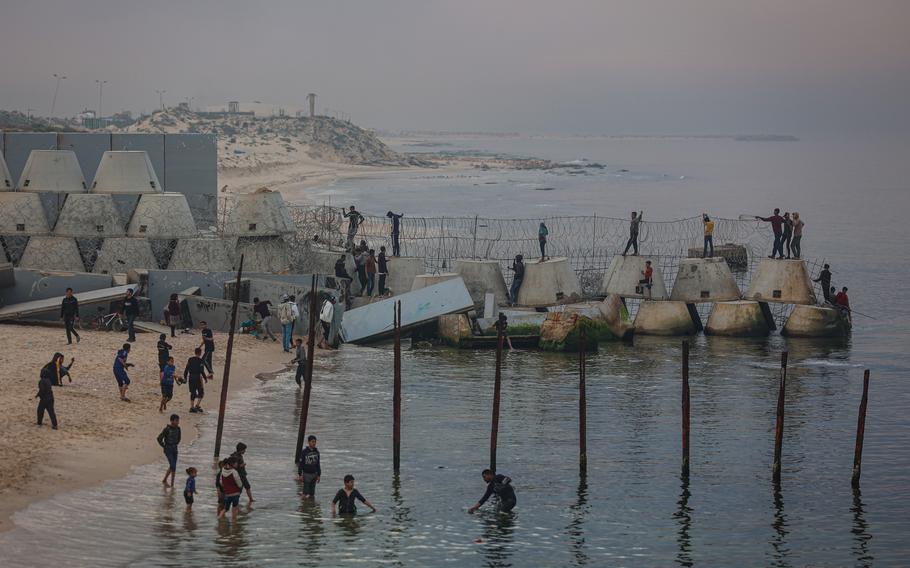
Palestinians on the beach in Rafah, near the border separating the Gaza Strip and Egypt, on Tuesday, Feb. 13, 2024. There are fears that an Israeli attack on Rafah will bury long-term peace efforts. (Loay Ayyoub/for The Washington Post)
Israeli Prime Minister Benjamin Netanyahu has given no indication that he is ready to budge on either Hamas demands for a hostage deal, or his opposition to a Palestinian state.
“Everybody who talks about a two-state solution — well, I ask, what do you mean by that?” Netanyahu said Sunday on ABC News’ “This Week.” “Should the Palestinians have an army? ... Should they continue to educate their children for terrorism and annihilation? Of course, I say, of course not.”
“The most important power that has to remain in Israel’s hands,” he said, “is overriding security control in the area west of the Jordan” river.
Recent trips to Arab capitals by U.S. Secretary of State Antony Blinken and visits to Washington by Qatar’s prime minister and Jordan’s King Abdullah II have focused on what Blinken, on a stop last week in Doha, called “the substance and the sequence of all the steps” needed to set “a practical, timebound, irreversible path to a Palestinian state living side-by-side in peace with Israel.”
“It’s coming ever more sharply into focus,” Blinken said.
The circle of support for a firm plan extends beyond the small group of those working on it directly. British Foreign Secretary David Cameron has expressed public interest in early recognition of a Palestinian state.
The European Union is “reaching out … to see how we can work together to have a larger plan that actually focuses on getting to the end of the conflict,” said Sven Koopmans, the E.U. special representative for the Middle East peace process. “That’s an actual peace process that wants to get to an independent, fully recognized Palestinian state and a secure state of Israel fully integrated in the region. Is that feasible? It’s extremely difficult, but in the absence of any other plan, we are interested in pursing this.”
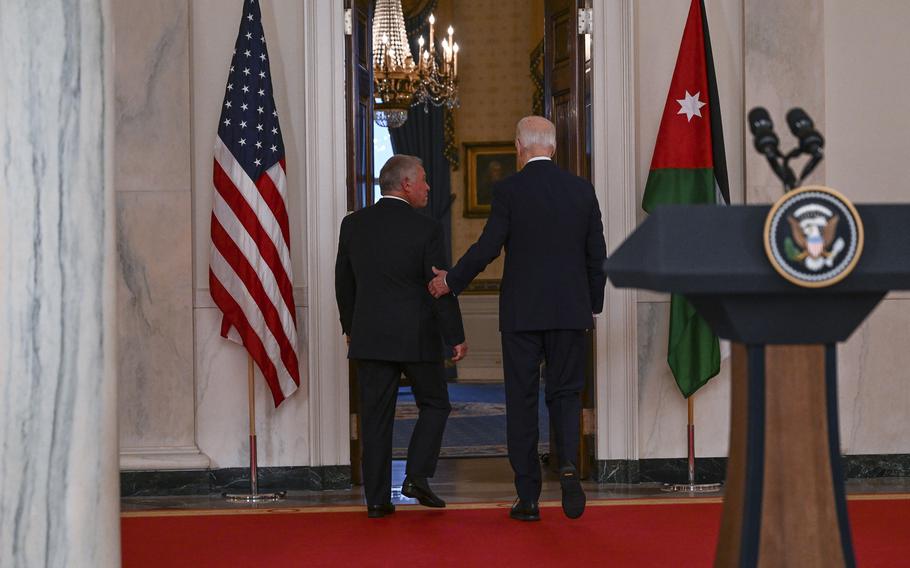
President Joe Biden and Jordan’s King Abdullah II depart after delivering remarks at the White House on Monday, Feb. 12, 2024. (Ricky Carioti/The Washington Post)
As the Biden administration faces upcoming elections, Koopmans said, “it can be helpful for others to share the responsibility of helping to end the conflict.”
Countries involved hope to discuss their plans with leaders from Europe and beyond at the annual Munich Security Conference that begins Friday.
U.S. officials said the menu of actions under consideration include early U.S. recognition of a Palestinian state — even as elements of political reform, security guarantees for both Israel and the Palestinians, normalization and reconstruction are being implemented.
“We don’t want to lose the momentum of this moment by doing this in pieces and in parts,” said a U.S. official briefed on the talks. There is a desire, the official said, to know “what this looks like from day one.”
But decades of failed attempts to bring about a two-state solution have some questioning the U.S. commitment, particularly in an election year in which the Israel-Gaza war and support for Israel have become major political issues.
“The language of a ‘process of peace’ was with us for 10 years in the ’90s and produced nothing,” said Amr Moussa, who served as Egyptian foreign minister from 1991 to 2001 and secretary general of the Arab League from 2001 to 2011. “That was just a trick.
“If we want to solve the problem, it is today and in concrete terms … there must be a time frame,” he said.
“My own view is none of this will matter,” said Khaled Elgindy, director of the Program on Palestine and Palestinian-Israeli Affairs at the Middle East Institute. “Just talking about statehood is a distraction. … It’s all smoke and mirrors. Unless they talk about ending Israel’s occupation” of the West Bank, “it doesn’t matter.”
In the meantime, Elgindy said, the Biden administration has shown little inclination to stand up to Israel, instead “just wringing their hands” and saying, “‘We wish you would allow more aid and kill fewer civilians.’ It’s Groundhog Day.”
Many believe that only U.S. recognition of a Palestinian state at the beginning of the process, even one whose final borders and institutions are not yet finalized, could convince the Arab world that this time will be different. While U.S. officials say that recognition in some form is on a list of possibilities, skeptics don’t see it happening any time soon.
“I’d be stunned if they extended de jure or de facto recognition to the state of Palestine” as an early part of a day-after plan, said Aaron David Miller, a former State Department adviser and coordinator on Arab-Israeli negotiations and a senior fellow at the Carnegie Endowment for International Peace.
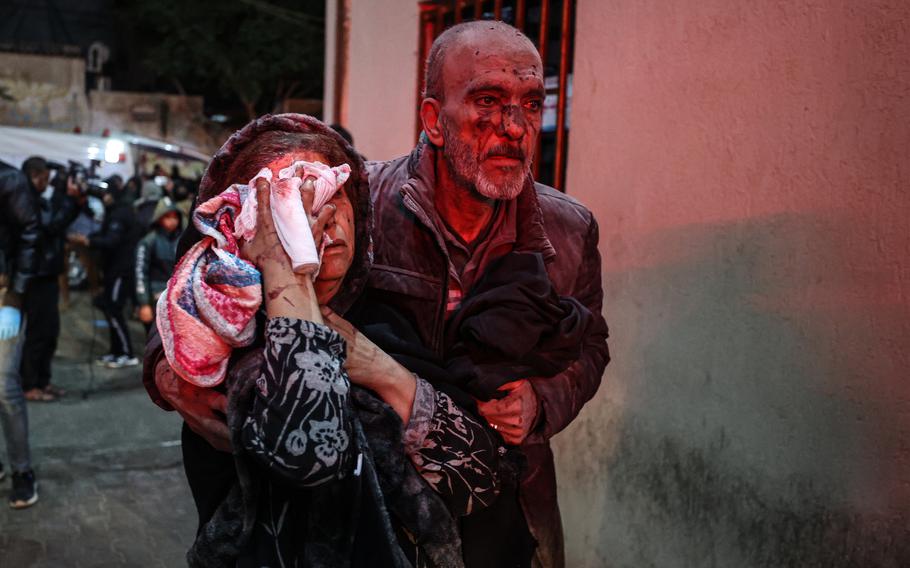
Wounded people were transferred to Kuwait Hospital following Israeli airstrikes on Rafah on Monday, Feb. 12, 2024. (Loay Ayyoub/for The Washington Post)
Miller agreed that any pledge of Palestinian statehood would be useless without concrete steps along a firm timeline. But he questioned whether the current leadership of either Israel or the Palestinians was capable of or interested in “any transformative solution.”
“Right now, this is about management,” Miller said. “This is not about transforming. They don’t have the leaders in place to pull the wagon.” Both Netanyahu and Palestinian Authority President Mahmoud Abbas “are more interested in keeping their seats,” he said.
Representatives of countries in the planning group say they recognize the difficulties of getting to an agreement on either side and have divided the labor, with the United States negotiating with Israel and the Arabs with the Palestinians.
“[Americans] think they can come here and play with us like building Lego,” said Tawfiq Al-Tirawi, a member of the Central Committee of Fatah, the largest faction in the Palestine Liberation Organization, which in turn forms the basis of the West Bank-ruling Palestinian Authority. “If we want to renew our leadership,” he said, “that’s purely our decision.”
Arab officials insist they are optimistic about bringing Palestinian groups together to establish a government of technocrats, rather than politicians, that would focus on revitalizing the Palestinian economy, improving ownership over security and rebuilding Gaza, followed by elections. Abbas has agreed in principle, several Arab officials said, and could perhaps retain his position as head of state in a role similar to that of Israeli President Isaac Herzog.
Participants in the talks are putting forward their own favored candidates to serve in other top government roles and debating whether Hamas’ political leadership would have any role in a postwar Gaza.
One Arab official said Hamas’ political wing should be included in the talks, if not in the future government. “We need someone there who represents them to ensure they’re on board with this,” the official said.
“If not, and they’re not happy about it, we will have Fatah and Hamas all over again,” the official said, referring to earlier confrontations between the two Palestinian groups that ultimately led to Hamas’ election as the governing power in Gaza. But if they can achieve two years of stability and prosperity under a revitalized government, the official said, “no one will choose Hamas” at the ballot box.
Claire Parker contributed to this report.
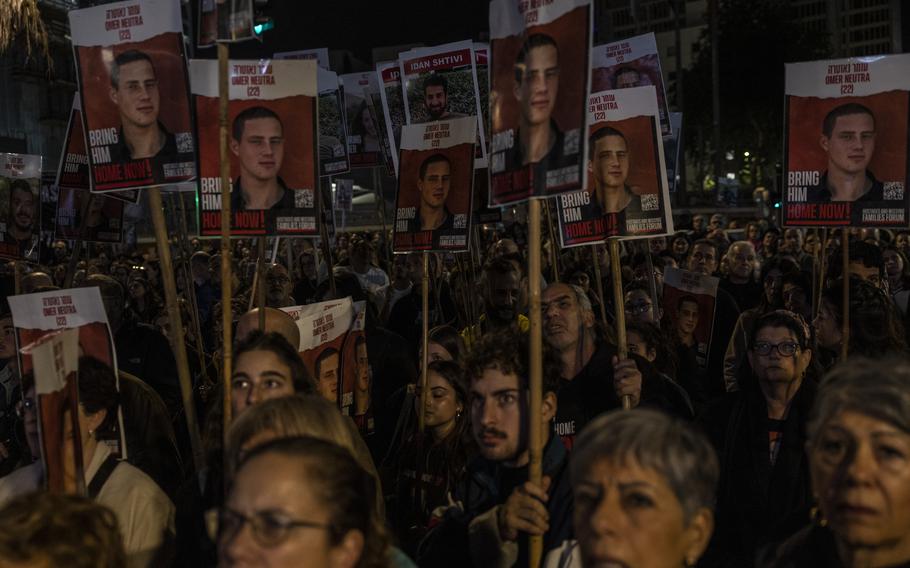
Thousands of people attended a rally in Tel Aviv on Saturday, Feb. 10, 2024, calling for the release of the hostages held in Gaza. (Heidi Levine/for The Washington Post)